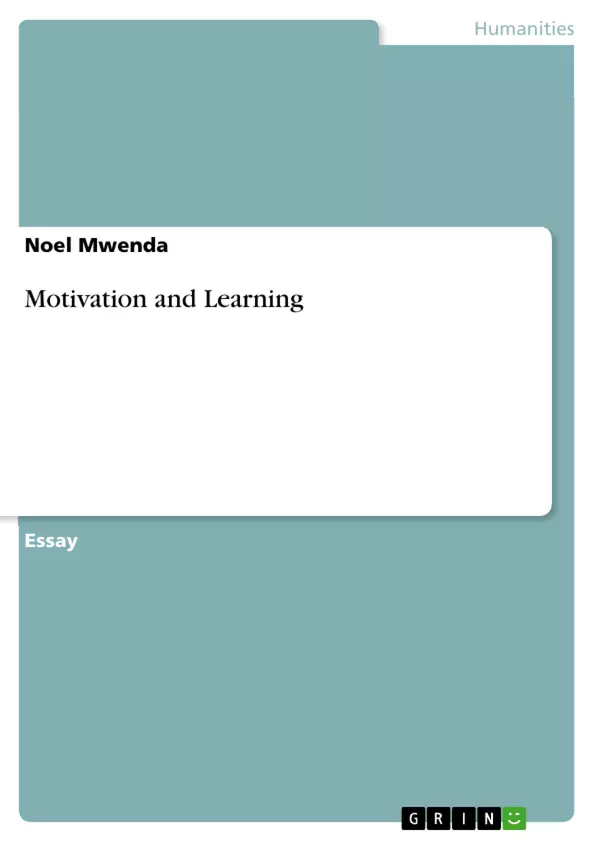Without motivation, there is no learning, motivation isn’t everything but it is a necessary condition for success, in truth much of what passes for teaching is demotivating even advanced learners do not take readily to sitting in a classroom, lecture theater, conference hall or training room, if they are not stimulated and motivated (Clark, 2007; Rao, et al, 2006). Of course, motivation is not the same thing as learning, and learning is not wholly down to motivation and there are many factors that affect both motivation and learning that are beyond the learner’s control (Clark, 2007). However, in an age where there’s fierce competition for the attention of learners, we are duty bound to recognize that motivation matters (ibid).The present work motivation and learning is prepared to provide a conceptualization of learning, learning processes, as well as characteristics of learning. Furthermore, this work provides a conceptualization of motivation and the way motivation is linked to learning, it also acquaints a reader to sources of motivation and the theories that describe motivation. Of greatest importance the work provides techniques of developing motivation in classroom as well as in learning.
Table of Contents
- INTRODUCTION:
- CONCEPTUALIZING LEARNING;
- LEARNING PROCESS:
- CHARACTERISTICS OF LEARNING..
- CONCEPTUALIZING MOTIVATION:
- MOTIVATION FOR LEARNING; .
- SOURCES OF MOTIVATION:
- THEORIES OF MOTIVATION:
- Arousal theory of motivation,
- Learning based Theories of motivation, ........
- The psychoanalytic theory of motivation,
- Maslow's Theory of self Actualization or Hierarchical of needs theory..
- The expectancy theory of motivation, ..
- TYPES OF MOTIVATION:
- Intrinsic motivation:
- Extrinsic motivation:
- FUNCTIONS OF MOTIVATION.
- TECHNIQUES OF DEVELOPMENT OF MOTIVATION IN CLASSROOM SITUATION.
- MOTIVATIONAL TECHNIQUES IN LEARNING: (RELATIONSHIP BETWEEN MOTIVATION AND LEARNING) ..
- CLASSROOM IMPLICATIONS FOR LEARNING..
- CONCLUSION,
- CONCEPTUALIZING LEARNING;
Objectives and Key Themes
This work aims to provide a comprehensive understanding of motivation and its relationship to learning. It explores the concept of learning, its processes, and characteristics, while also delving into the nature of motivation, its sources, and various theories that explain it. The text focuses on practical techniques for developing motivation in classroom settings and how motivation impacts the learning process.
- Conceptualization of Learning and Motivation
- Theories of Motivation and Their Application to Learning
- Developing Motivation in Classroom Settings
- The Relationship between Motivation and Learning Outcomes
- Classroom Implications for Effective Learning
Chapter Summaries
The introduction lays the foundation for the study by introducing the concept of motivation and its significance in the field of psychology. It highlights the historical importance of understanding motivation and previews the key topics covered in the work.
The chapter on conceptualizing learning provides a comprehensive definition of learning, encompassing its various aspects, including knowledge acquisition, skill development, and behavioral changes. It also delves into the learning process and its characteristics, outlining the intricate stages involved in acquiring new knowledge and skills.
Moving on to the concept of motivation, this section delves into the definition, sources, and theories of motivation. It examines the different factors that influence motivation, including intrinsic and extrinsic drives, and explores the various theories that attempt to explain the underlying mechanisms of motivation.
The subsequent chapter focuses on techniques for developing motivation in classroom settings. It discusses practical strategies and methods that educators can employ to foster a conducive learning environment and inspire students to engage actively in the learning process.
Finally, the chapter on motivational techniques in learning examines the intricate connection between motivation and learning outcomes. It explores how motivation plays a crucial role in enhancing learning effectiveness and discusses various techniques that can be implemented to optimize the learning process and achieve desired results.
Keywords
The central focus of this text lies in the interconnectedness of motivation and learning. It encompasses key concepts such as learning processes, motivation theories, intrinsic and extrinsic motivation, classroom motivational techniques, and the impact of motivation on learning outcomes. The work explores these concepts within the framework of educational settings, providing insights into the role of motivation in fostering effective learning experiences.
Frequently Asked Questions
Why is motivation considered a necessary condition for learning?
Without motivation, learners are unlikely to be stimulated or engaged, making successful learning difficult even in structured environments like classrooms or training rooms.
What are the main types of motivation discussed?
The work distinguishes between intrinsic motivation (internal drive) and extrinsic motivation (external rewards or pressures).
Which psychological theories explain motivation in this text?
Key theories include Maslow's Hierarchy of Needs, Expectancy Theory, Arousal Theory, and Learning-based theories of motivation.
How can motivation be developed in a classroom situation?
The work provides specific techniques and strategies for educators to foster a conducive learning environment and inspire student engagement.
What are the characteristics of the learning process?
Learning is conceptualized as an intricate process involving knowledge acquisition, skill development, and behavioral changes.
- Quote paper
- Noel Mwenda (Author), 2012, Motivation and Learning, Munich, GRIN Verlag, https://www.grin.com/document/193905



